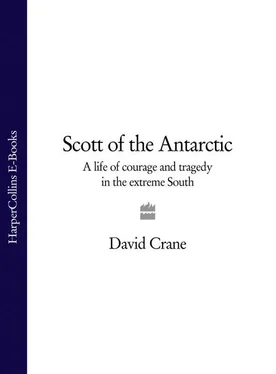Close as the children would always be, it was not within the circle of his siblings that Scott’s childhood was shaped, but by the dynamics of family ambitions that stretched back to his grandfather, Robert. In any sensible society – or European nation of his own day – a child of Scott’s type would have ended up as an engineer or scientist, but for a boy of his class in Victorian England the future was circumscribed by the deadening monopoly of the old professions, and at the age of eight, home and his sisters’ governess were exchanged for a day school at Damerel, from where, at eleven or twelve, he was packed off by his father to board at Stubbington House in Fareham, a naval crammer that prepared boys for the entrance exams to the training ship Britannia .
If Scott had any say in the choice it has gone unrecorded, but it would be hard to imagine a better berth for a training ship or for a child of any imagination than the River Dart. Sheltered by steep hills on either bank and protected from the sea by a sudden bend in the river, the Britannia lay moored just above the ancient port of Dartmouth, ideally positioned for the rough training ground of the open channel and the quiet waters of the river.
There can be few more beautiful ports anywhere, and if a boy from Plymouth needed no lesson in England’s maritime past, Dartmouth’s history was just as rich. The natural harbour had become too small to retain its old importance by Scott’s day, but even after its historic role in the old triangular trade of cod, salt and wine had been usurped by Liverpool, the town still preserved links with the New World and English naval life that stretched back through the Dutch and Civil Wars to Sir Humphrey Gilbert and Elizabeth’s reign.
The Britannia was a product of the mid-Victorian navy’s determination to control and standardise its officer intake. In the first half of the nineteenth century a boy’s education was dependent on the goodwill and interest of the individual ship’s captain, but in 1857 an Admiralty circular announced a new regime of training and examinations for all future officers that would include a period of time on a stationary ship before they were allowed to go to sea. The initial training ship had been established at Portsmouth, but Britannia had first been towed to her mooring on the Dart in September 1863, and in the following year, as numbers grew, was joined by a second vessel, the Hindostan . In 1869 the Britannia herself was replaced by a bigger ship, and it was this Britannia – the eighth of her name – that Scott knew, an old sailing vessel of over six thousand tons, with a draught of thirty-one feet and a length of 251 feet, a gangway linking her to the Hindostan and a fully rigged foremast to test the seamanship, agility and courage of her cadets.
And it was in this Britannia , too, for the next thirty years, until she was replaced by a shore-based college, that the navy trained its future leaders. At the time of the First World War there was scarcely a senior officer who had not passed through Dartmouth, not a man above the rank of lieutenant-commander who had not been moulded by the same ethos and training that produced the men who fought at Jutland or went south with Scott. ‘That training,’ the biographer of Earl Beatty – the navy’s most flamboyantly glamorous admiral since Nelson – wrote of Britannia in the mid-1880s, the years immediately after Scott was there, ‘was based on forcing cadets into a pre-conceived and rigid mould by the application of harsh, even inhuman discipline. Obedience to orders was the hallowed principle of the system, and woe betide any boy who was deemed to have transgressed that tenet. Any signs of originality or independence were seriously frowned on – if not actively suppressed; while intellectual accomplishments always came a bad second to athletics.’
In many ways, this makes it little different from any Victorian public school in its aspirations. From the days of Thomas Arnold the ambition of every public school was to produce a ‘brave, helpful, truth-telling’ English Christian gentleman, but whereas the Arnoldian ideal was to mould the men who would run the Empire or clear out slums, the aim of Britannia was to take the sons of these gentlemen and refine – or brutalise – them into the more specialist incarnation of the British naval officer.
This might have mattered less if the navy still recruited from a more inclusive social base, or if the curriculum in Scott’s day had been any wider, or had more strenuously faced up to the realities of the age of steam. When Britannia was first established twenty years before, the range of subjects was more or less typical of the wider educational world, but by 1883 this had shrunk back to a far more vocational training – Arithmetic and Algebra (to read across Scott’s Final Examination Results), Geometry, Trigonometry, Plain and Spherical, Practical Navigation, Theoretical Navigation, Charts, Instruments and Observations, French, Essay, Physics and Drawing.
In practice little attention was ever given to ‘Extra Subjects’, or, in fact, to study at all – in Scott’s term, or intake, only three cadets got so much as ‘Fair’ for ‘Attention paid to Study’ – and with no engineering workshop, no gunnery officer, no instruction in command and a heavy emphasis on seamanship, a Britannia training put a cadet firmly in the camp of the dinosaur. ‘I call the whole system of our naval education utterly faulty,’ the young Jellicoe – future First Sea Lord and Commander-in-Chief of the Grand Fleet at Jutland – writing under the nom de plume of ‘A Naval Nobody’, protested in Macmillan’s Magazine : ‘I say that we, the Navy’s youth, are in some professional matters most deplorably ignorant, and the day will come when we, England, will wake up to the fact with a start. It sounds impossible, inconceivable, that it is only a privileged few who are allowed to make a study of gunnery … only a privileged few who are initiated into the mysteries of torpedos; only a privileged few who are taught … surveying and navigation; not even a privileged few who are taught the science of steam; and yet all this is so!’
It was an education for an age of sail, designed for a profession that envisaged no scope for individual responsibility, and enforced with all the rigour of nineteenth-century naval discipline. From the moment that Scott woke, his day was regulated to the sound of bugle calls or drum rolls, to the barking of orders and the running of feet, as the cadets were marched from bath house to inspection deck, from inspection to Euclid, from Euclid to breakfast, and from their breakfast across the gangway to Hindostan and back to Britannia ’s poop for another inspection, prayers – and all that before the day proper had even started. Even their swimming was controlled by bugle call, even the casual brutality of the discipline institutionalised by a system of numbers. For severe offences there was the cane and the captain, but for everything else, the Commander’s Punishments ranged from 1 to 7, with ‘No. 4’ – Scott’s most common penalty – including ‘an hour early in the morning, an hour out on the deck after evening prayers, extra drill and stopped pocket money’. ‘19 Oct, ’81,’ Scott’s charge sheet typically reads:
Entering an orchard whilst on Half holiday … March 11th 1882, Skylarking at Morning Study, [punishment] 1 days 3; Sept 18th Late for Muster, 1 days 4; Oct 3rd Not being into his place in the ranks when 2nd bugle sounded, 1 days 3; Oct 6th Talking in his Hammock after hours, 1 days 3; Oct 11th Being into Hindostan Contrary to regulations, 1 days 4; Oct 13th Going on the Middle deck in his night shirt, 1 days 4; Oct 15th; Creating a disturbance on sleeping deck, 1 days 4; Oct 16th Making a noise in his Hamk after hours, 1 days 3; Nov 5th Talking in his Hamk after hours, 1 days 3; Nov 9th Improperly dressed at Muster, 1 days 2; Nov 22nd Delaying to come out of the bath, 1 days 3 …
Читать дальше












![John Bruce - The Lettsomian Lectures on Diseases and Disorders of the Heart and Arteries in Middle and Advanced Life [1900-1901]](/books/749387/john-bruce-the-lettsomian-lectures-on-diseases-and-disorders-of-the-heart-and-arteries-in-middle-and-advanced-life-1900-1901-thumb.webp)